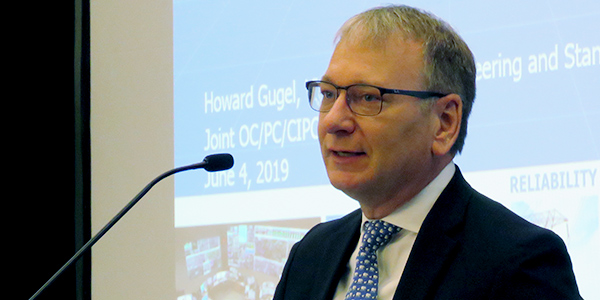By Rich Heidorn Jr.
ORLANDO, Fla. — NERC’s task force on electromagnetic pulses (EMPs) will hold its first face-to-face meeting at the ERO’s offices in D.C. on June 12, but if you’re not already signed up, it’s too late to attend in person.
Director of Engineering and Standards Howard Gugel told a joint meeting of the Operating, Planning and Critical Infrastructure committees here on June 4 that the meeting was already full but that the daylong session will be accessible via WebEx.
Gugel said NERC is planning a workshop on the subject for late July that will be held in a larger venue.
The task force was formed in response to the Electric Power Research Institute’s April report on EMPs, which concluded that a high-altitude nuclear explosion could cause a multistate electric outage but not the nationwide, monthslong blackout some observers have warned of. The EPRI report focused on the grid and transformers and did not examine potential impacts on generation. (See “NERC Task Force to Build on EPRI EMP Study,” NERC Standards News Briefs: May 8-9, 2019.)
“As we knew this report was coming out, we decided we needed to get a better understanding of how EMPs could affect our grid and if there were any potential actions that needed to be taken,” Gugel said. “So we reached out to the trade organizations to ask for a small representative number of individuals who had some expertise in the area that could look through the report and determine if there were any immediate actions that needed to be taken and to provide some direction.”
Gugel said the task force has not been formalized with a reporting relationship to any standing committees but that its structure could change in the future.
The task force, which is broken into three committees, will make any recommendations to the technical committees by the third quarter. Guidelines or best practices is one potential result, he said.
“Of course, everyone hates to use the dreaded SAR [standard authorization request] word. We’re certainly not jumping to any kind of standards solution,” he said. “But if, when that team is looking at that, they feel there’s something that needs to be addressed — whether it’s through our existing body of standards or a new [one] they develop — then that SAR would be presented to the Standards Committee, if applicable, in the fourth quarter of this year.
“I don’t want to raise everyone’s standards radar at this point,” he added. “I want to assure you that this is not the priority that this team is looking at.”
Supply Chain Data Request Coming
Gugel also said NERC staff are collaborating with the Supply Chain Working Group to develop a data request on supply chain cybersecurity that should be issued about July 2.
The data request is in response to a recent staff report that recommended additional study on whether low-impact systems with external routable connectivity should be covered by reliability standards. (See “Supply Chain Report Recommends Expanding Standards,” NERC Standards News Briefs: May 8-9, 2019.)
Gugel said staff drafted “strawman” questions for debate by the working group. “Any time we, as staff, try to develop something like that, we always seem to ask the wrong questions. So I’m very grateful that we get industry weighing in on this and helping us get the right questions.”
The responses will be due July 22, in time to share results with the Board of Trustees at its August meeting, Gugel said.





